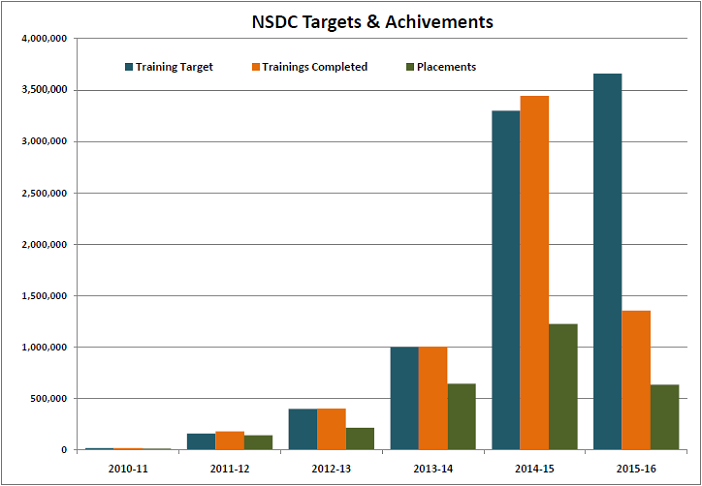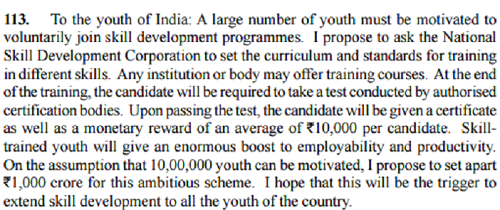[orc]The Union Cabinet approved two major changes to the PMKVY scheme. States will now have a major role to play in this scheme with 25% of the targets assigned to them. The monetary reward to the student will now be replaced by a grant to the training partner.
Two years after coming into power, the NDA government has made a major change to the flagship skill development program of the government, the Pradhan Mantri Kaushal Vikas Yojana (PMKVY). In a major decision based on the recommendations of a sub group of Chief Ministers on Skill Development, the union cabinet has now approved allocating 25% of the total training targets to the state governments. The 25% of the total training targets (physical & financial) will now be allocated to the state governments to address the unique skill requirements in various states.
STAR & PMKVY
While different ministries/departments have been implementing their own skill development schemes for many years now, the mention of a mission-mode project to launch a world class skill development program was made in the budget speech of 2008-09. Thus NSDC was launched in 2009 to bring in uniform norms and scale up skilling activities across the country. The Government of India (GoI) holds a 49% stake in NSDC while the private sector holds 51% stake.
At present, there are more than 40 skill development programs of the Government of India (GoI) being implemented by 18 different central ministries/departments. Some the schemes follow the National Skills Qualifications Framework (NSQF), notified in the year 2013.
The first ever monetary reward scheme for skill development was launched in the year 2013 after it was announced in the 2013-14 budget. Thus the STAR (Standard Training Assessment and Reward) scheme was launched in August 2013.
The STAR scheme was rechristened as PMKVY after the NDA came to power. Both PMKVY and STAR are Skill Certification & Monetary Reward programs. Both the schemes were implemented by the Government of India through the various Sector Skill Councils (SSCs) and NSDC. Training Partners affiliated to NSDC and SSCs are entrusted with the job of skilling. Thus state governments had very little role to play in the implementation of these schemes. The decision of the Union Cabinet seeks to change that.
States will have a major role to play & monetary reward dropped
The Union Cabinet has approved an outlay of Rs.12000 crore for PMKVY to impart skilling to one crore people over the next four years (2016-2020). PMKVY will impart fresh training to 60 lakh youth and certify skills of 40 lakh persons acquired non-formally under the Recognition of Prior Learning (RPL).
As per the decision of the Union Cabinet, State Governments would be involved through a project based approach under the PMKVY with 25% of the total training targets, both financial and physical. The financial budget for achieving 25% of the total training targets would be directly allocated to the States.
In another major change, PMKVY would now be a grant based model where the training and assessment cost would be directly reimbursed to training providers and assessment bodies instead of the monetary reward that was being extended to students.
However, financial support to trainees will be given in the form of travel allowance, boarding and lodging costs. Post placement support would be given directly to the beneficiaries through Direct Benefit Transfer (DBT). PMKVY will also focus on skill training aligned to international standards for overseas employment in Gulf countries, Europe and other overseas destinations. There will be scholarship for student undergoing training in high end job roles under the Scheme.
Will these changes result in better outcomes?
There is definitely a need for a massive skilling initiative in India. As per National Policy for Skill Development and Entrepreneurship 2015, only 4.69% of the total workforce in India has undergone formal skill training as compared to 68% in UK, 75% in Germany, 52% in USA, 80% in Japan and 96% in South Korea.
The NSDC’s targets and achievements in the last few years present a mixed picture. While the skilling space was definitely galvanized, placements were definitely off the mark. The training targets were achieved, but that does not show in the placements. In the last two years, placements were less than 50% of the trainings completed. In fact, these placement numbers are not reflected in the statistics of the labour bureau.
 (The numbers of 2014-15 include the numbers from the previous STAR scheme as well)
(The numbers of 2014-15 include the numbers from the previous STAR scheme as well)
The mismatch between training and placement numbers could be because of the lack of proper monitoring, very little role for the states to play etc among other reasons. The monetary reward also became a tool for committing financial fraud leading to allegations of irregularities. The two major changes mooted now could make a significant impact. States can now choose the skill programs and courses relevant to the Industry in that state. This could in itself boost the placement numbers. The grant model would also reduce scope for irregularities provided it is coupled with a strong monitoring & evaluation system.



